Step 9: Reconciliation
Here we begin what may be the most challenging aspect of the Twelve Steps for Spiritual Growth. We’ve completed all the steps leading up to our final reconciliation with the people who share our world with us. All that’s left is the doing. Here is Step 9.
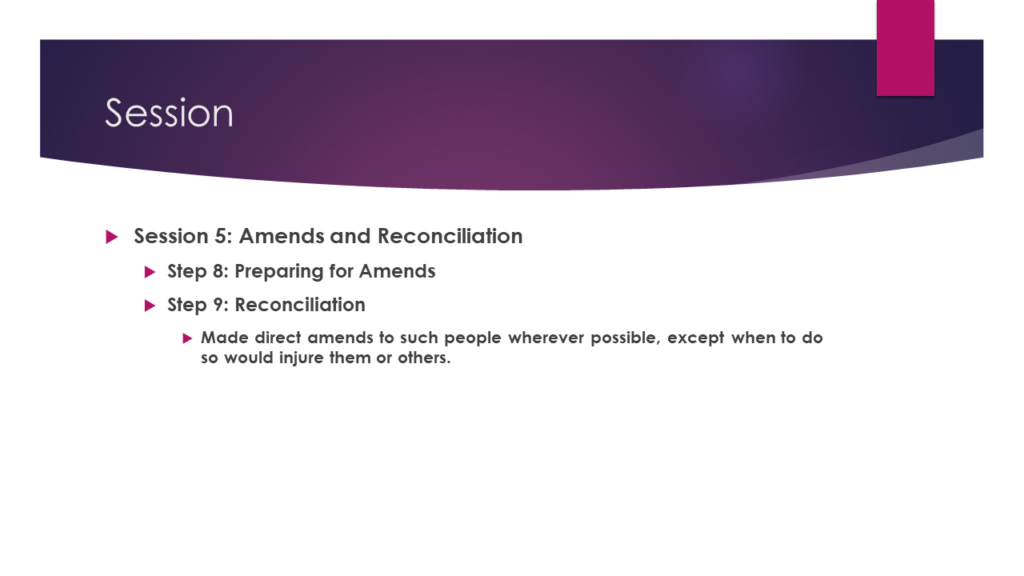
“Made direct amends to such people wherever possible, except when to do so would injure them or others.” Let’s take a quick look at what this step entails.
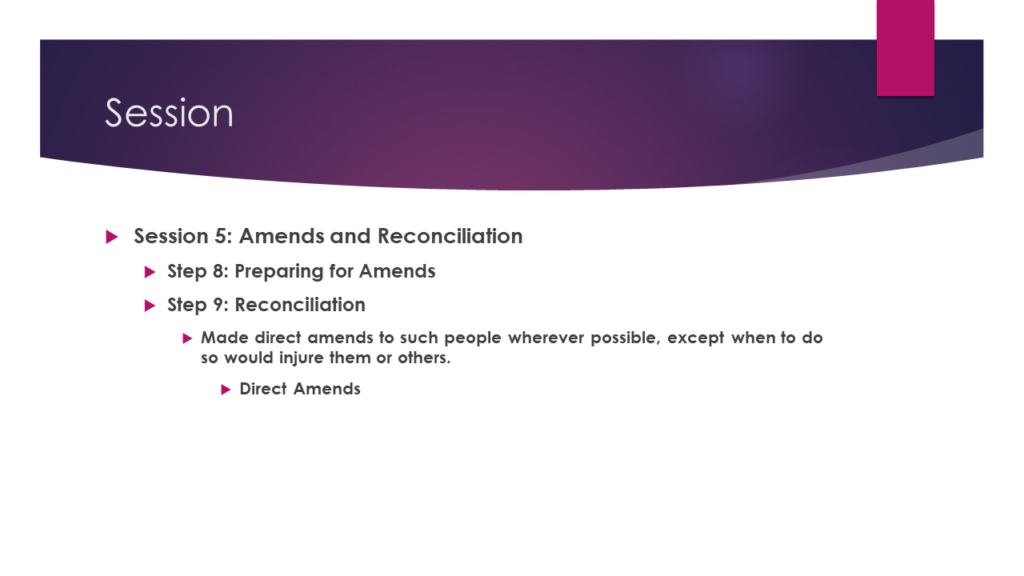
“Direct amends” are made face-to-face whenever possible. Part of the treatment of our spiritual illness involves allowing our egos to suffer the consequences of their behavior. We approach others with humility, conscious of what we’ve done, and willing to face the music. We’ll speak about that more when we discuss how to make an amends and what to expect. For now, suffice it to say that we ask God to provide us with the knowledge and strength necessary to carry this out effectively.
What if it’s not possible to make a face-to-face amends? Will a personal phone call suffice? How about a handwritten letter? Yes, if necessary. If, for example, arranging a face-to-face meeting would postpone the amends too long or would be prohibitively expensive in cost or time. In that case, phone calls might be preferable because the receiver would be able to hear your tone of voice. Emails or texts are entirely too impersonal and would not be appropriate. In fact, they could be viewed as insulting.
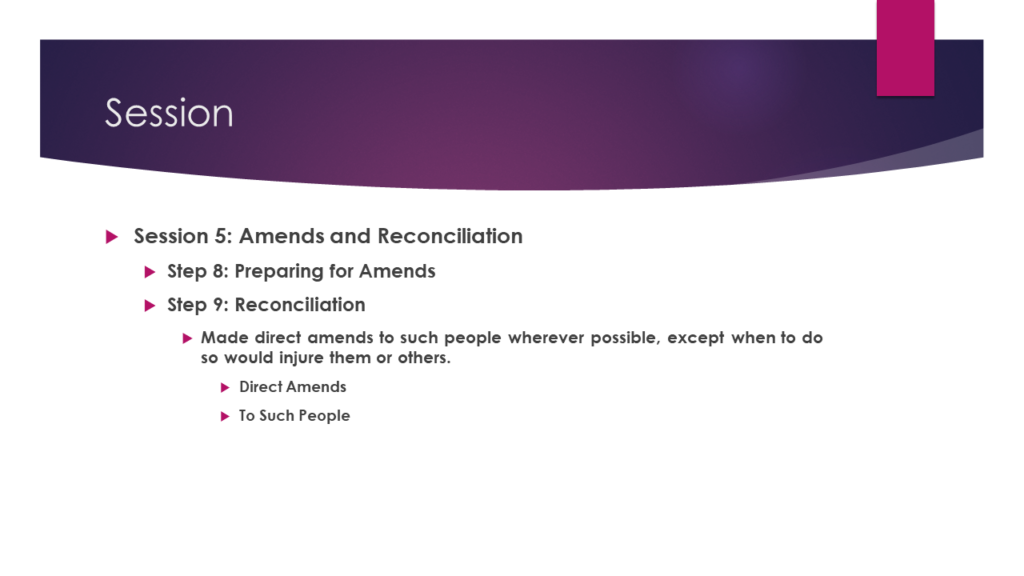
“To Such People.” This is where our Eighth Step Inventory sheet comes in. You’ve already sorted the people in your list into appropriate categories. Start with the top of your “Right Away” column and go down the line. You might want to start with those you won’t be able to visit with personally and make those telephone calls where possible. That would certainly get you off to a good start. Use your “Notes” column to track your progress. Stick with one column at a time and take your time. You created these situations over time, you don’t need to correct them all in one day.
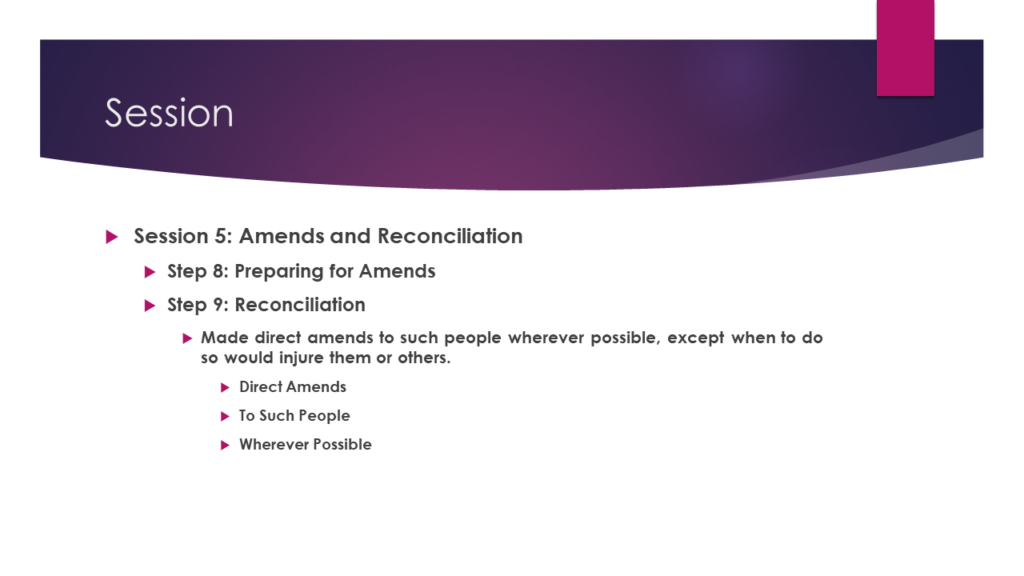
“Wherever Possible.” Once again, to repeat, this is an exercise in the possible. As people with easily-bruised egos, we may have a tendency to insist on perfection. Perfectionism is a character flaw. When trying to contact someone becomes an unreasonable burden, or seemingly hopeless, there is no shame in admitting defeat. Remember that God is in charge of this whole process. There will be people you’d like to contact whom you won’t be able to and people you’d hope not to contact whom you will. Accept the process as the Power greater than yourself lays it out for you. Remember that, even in this, you aren’t in control of the outcome.
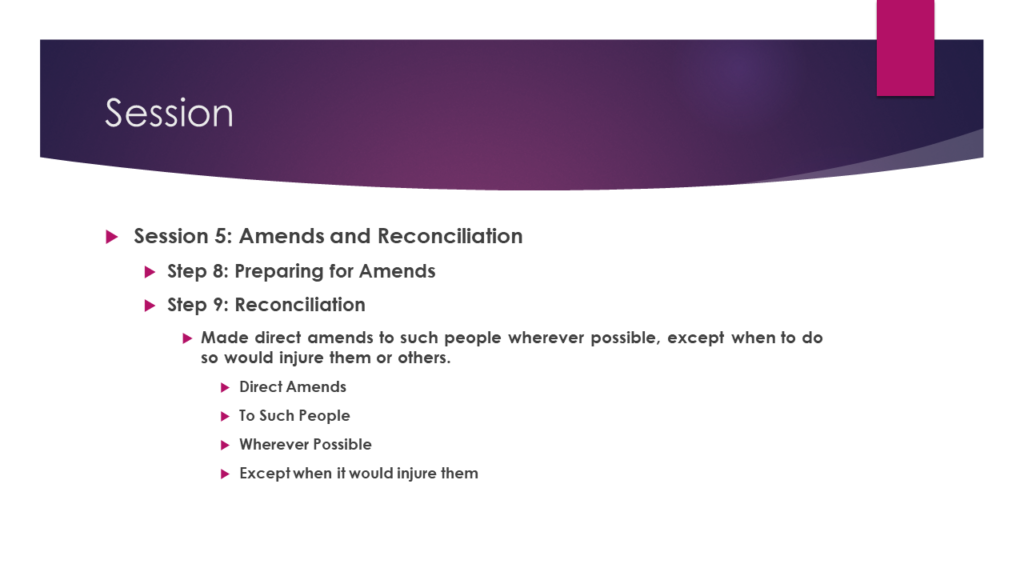
“Except when it would injure them.” We covered some of this in Step 8. This is the mistake that people make when they go off and try to make amends without proper thought or preparation. Step 9 is a delicate operation, and it requires strategic thinking. In any given situation, what do suppose the results will be (regardless of how well or ill it’s received)? Will the person to whom you’re making amends be better off for their encounter with you? Think it through carefully. Don’t be afraid to make a partial amends, if necessary.
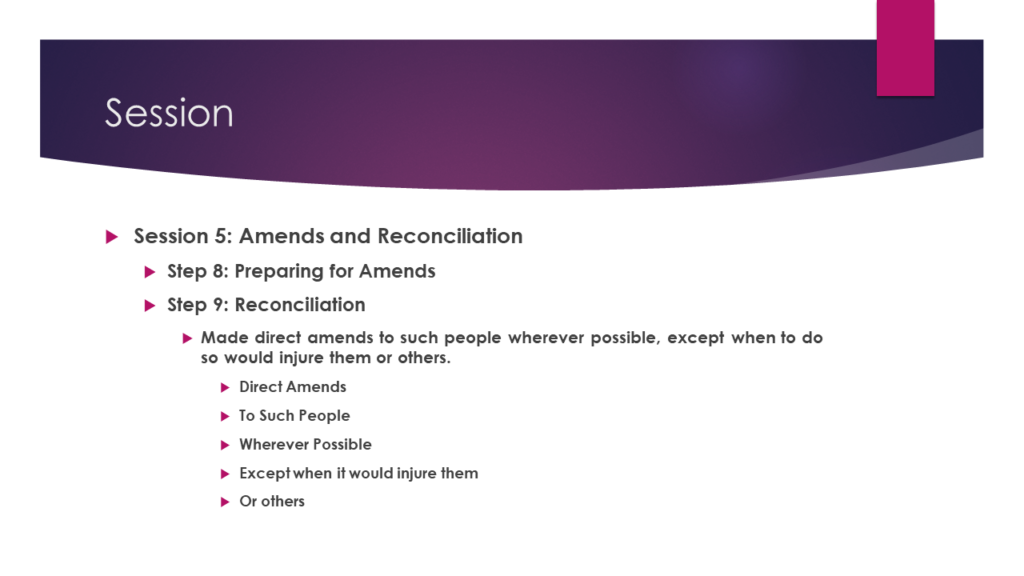
“Or others.” How could your amends negatively affect the people around your listener? How about their families and loved ones, or their fellow workers? Or, for example, it might be most prudent for someone to skip an amends when they’ve had a secret affair with their husband or wife. Some people forget that “others” includes yourself. There were instances where making an amends landed the amends-maker in prison. It’s not necessary to put yourself in jeopardy, or even to go into detail about what your fault had been when those details aren’t already known. Be very careful about injuring yourself. In all cases, it’s a good idea to share your plans with a trusted advisor who’s knowledgeable about this amends process. How should we proceed?
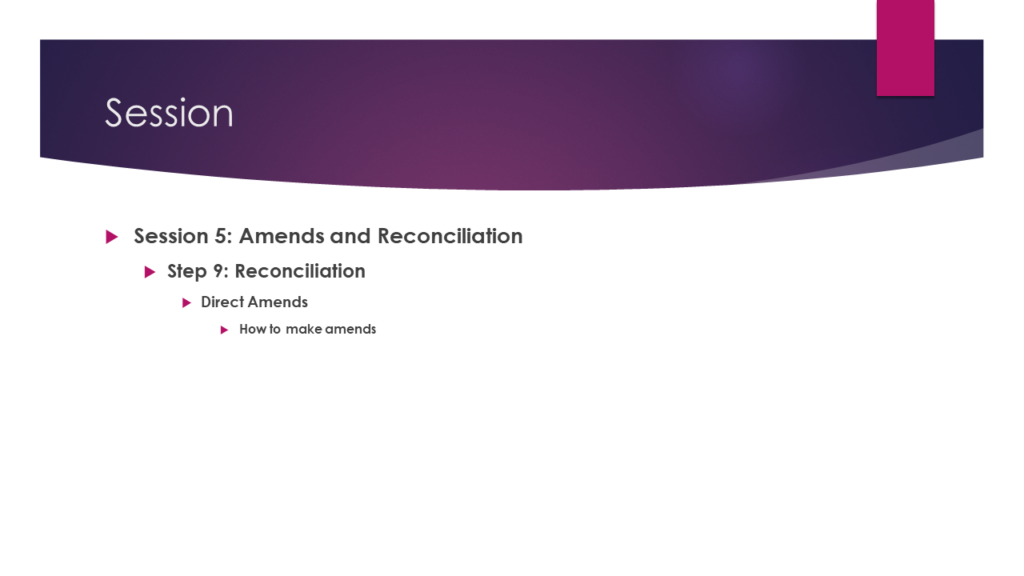
When you approach someone with an amends, you might want to begin by saying something along the line of, “I need to apologize to you for something.” How you proceed from there will depend on how close a relationship you’ve had with the person you’re apologizing to. If it’s a close relationship, you might want to go into some detail as to what you did, perhaps referring to a specific incident or incidents. Admit your fault. For example, “When I said such-and-such, I was unkind,” or “What I did yesterday was uncalled-for,” or even “I’ve been a real jerk to you lately.” As I’ve mentioned, give only as much detail as necessary for your listener to understand what you’re talking about. Then, there are only three things that you need to say:
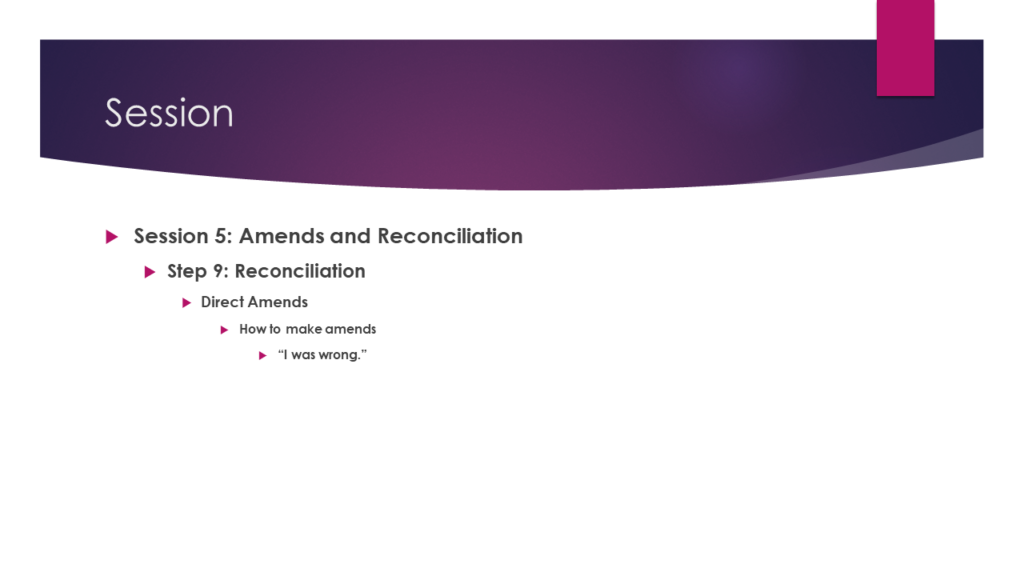
“I was wrong.” There’s a period at the end of that sentence. There’s no qualifying verbiage necessary or wanted. Most of all, there’s never a “but.” The word “but” negates everything that goes before it. “I was wrong but…” is no apology at all. If you find yourself explaining anything, stop! You’re excusing yourself. That’s an ego-protecting character flaw. There’s no excuse for making excuses when making an amends. The simple phrase “I was wrong” is quite enough. It takes responsibility. That’s all you need to convey.
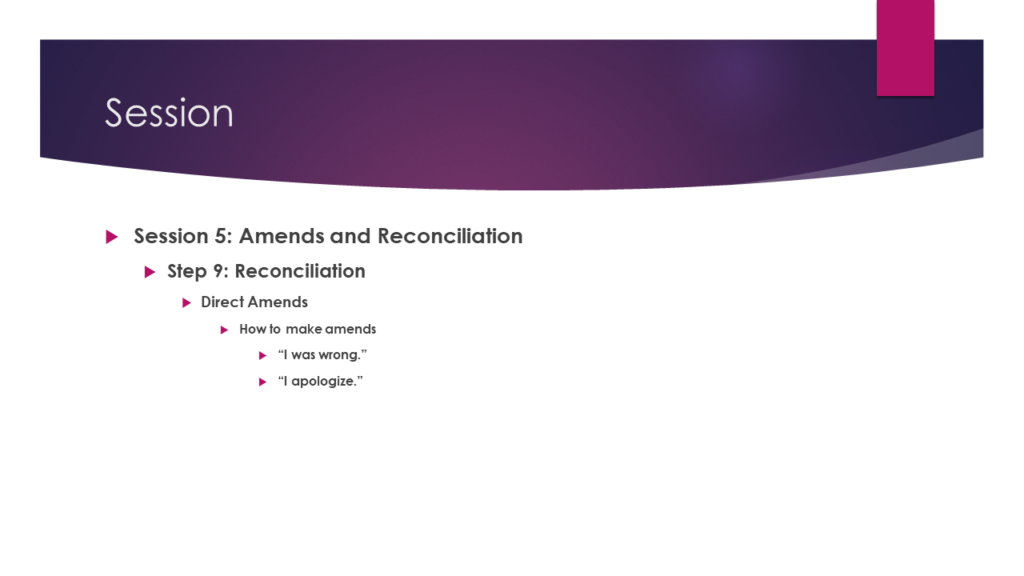
The phrase “I apologize” is also sufficient unto itself. Avoid saying “I’m sorry.” How often have you said you were sorry and then gone off and done the same thing or worse. Beware of the frequently-used non-apology apology, “I’m sorry you feel that way.” “Sorry” comes from “sorrow” and expresses how you feel. “I apologize” is taking responsibility pure and simple. That’s what you need to convey, and that’s what your listener may be open to hear, not how you feel about it.
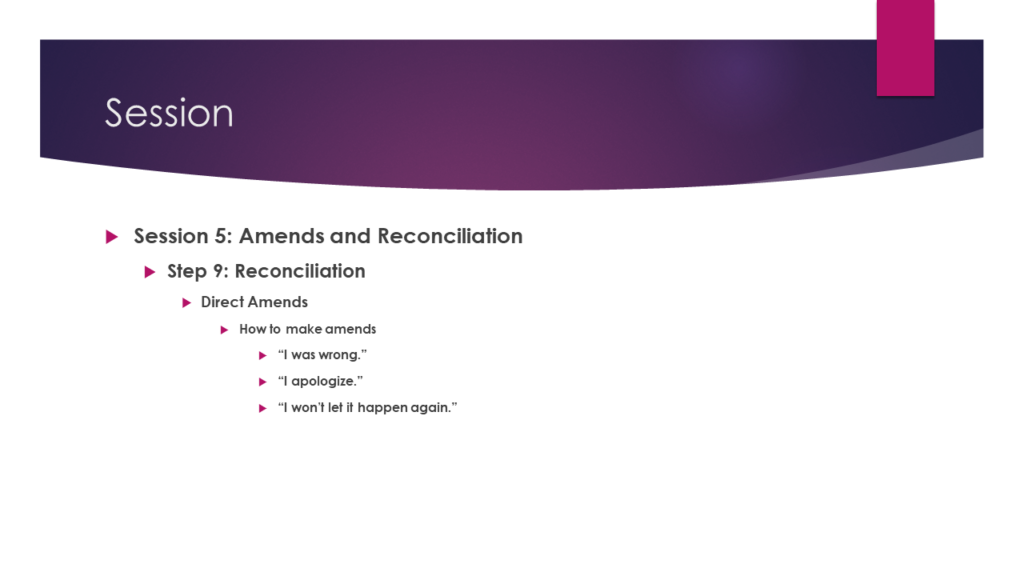
“I won’t let it happen again.” Once more, we’re all too familiar with glib apologies that mean nothing. Adding the phrase “I won’t let it happen again” tells the listener that you want to change and make things different. You’re telling them you’re not satisfied with the same-old same-old. You’re making a commitment to do things differently this time…and next time. You genuinely want to change your behavior, but remember it’s not for them, it’s for you. You want to do things differently because that’s the way you implement your spiritual growth. As you’re about to see, how they take it is none of your business. What can you expect from your listener?
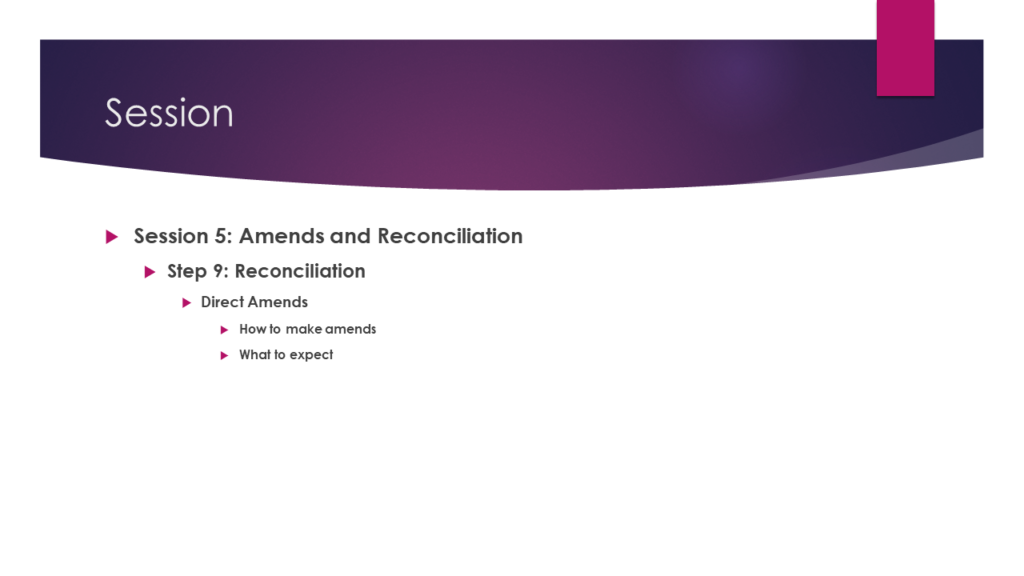
As long as can keep in mind that these amends are for you and not for anyone else, you’ll be all right. If you want to know what to expect in return for your amends, expect nothing. The reactions from your listeners can and will be as varied as the people themselves and the situations for which you’re apologizing. However, the one reaction you must not be seeking is forgiveness. You’re not asking for forgiveness, you shouldn’t be looking for it, and you shouldn’t be expecting it. If your listener says, “I forgive you,” that’s fine. That’s on them. Your job is to remain neutral to any and all responses on their part.
Here are some possible reactions. Let’s start with the best reaction: gratitude.
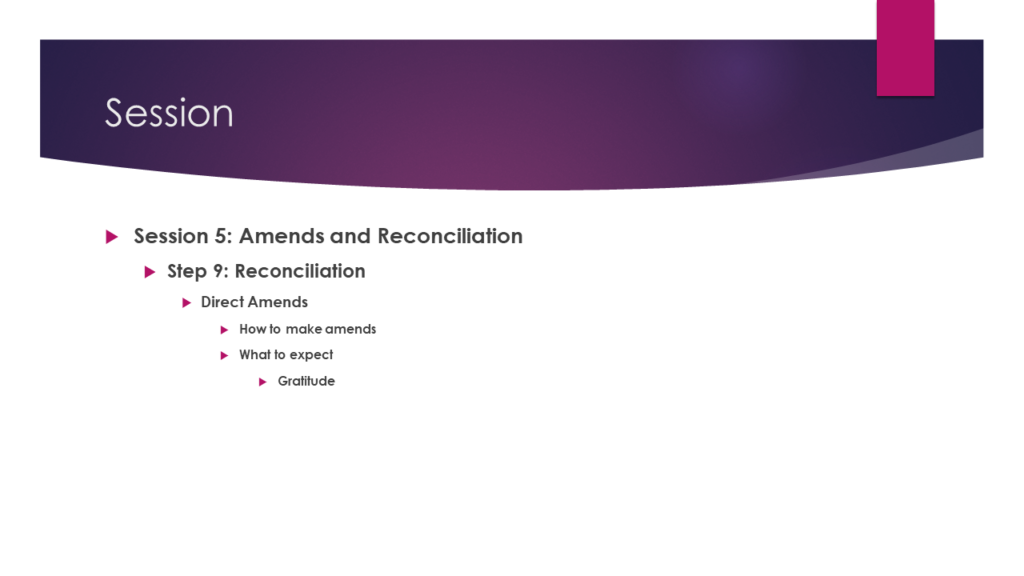
“Gratitude.” In this scenario, your listener is genuinely grateful that you took the time and energy to approach them. They appreciate what you’re doing and let you know that. They may even give you some sign of reconciliation. However, once again, it’s not something that you should ever be anticipating. Their reaction is theirs alone.
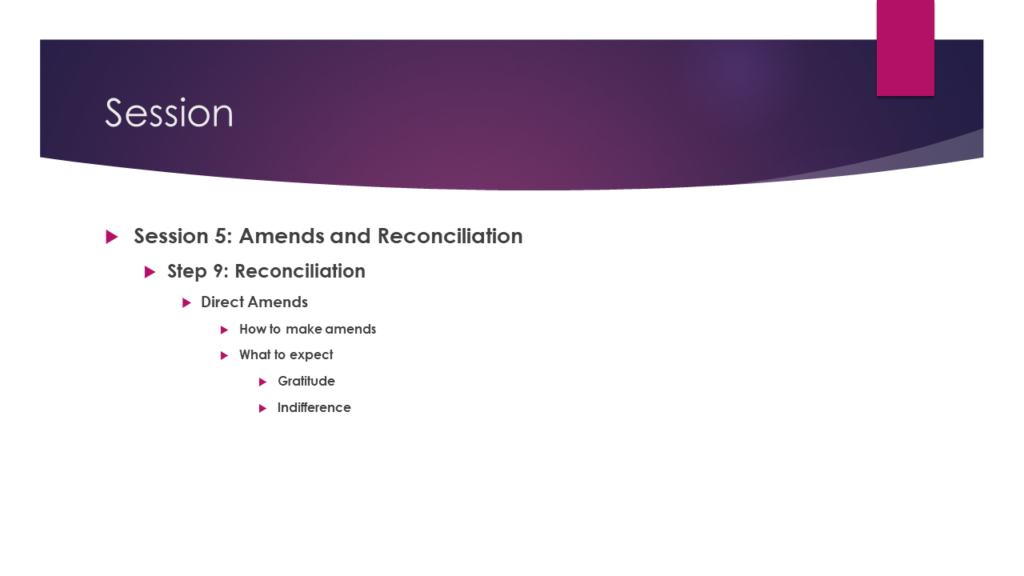
“Indifference.” Many times, your listener’s reaction will, surprisingly enough, be indifference. This can happen for a number of reasons. One of the most frequent reasons is that they have forgotten all about what you’re apologizing for. A guilty conscience nags you, not your victims. We all imagine that we’re the most important people in everyone else’s life, and it’s ego-deflating to realize that we’re not. Another reason for their indifference might be that they simply don’t care. You’re not important enough to them to bother with. That often happens when our behavior has burned bridges behind us. After enough abuse, even people who once cared can give up. You might even hear something like, “So what?” or even, “If you have to do that for your own conscience, good for you. I don’t care.” Don’t let that throw you. You’re not out to win a popularity contest. You’re only there to clean up your messes.
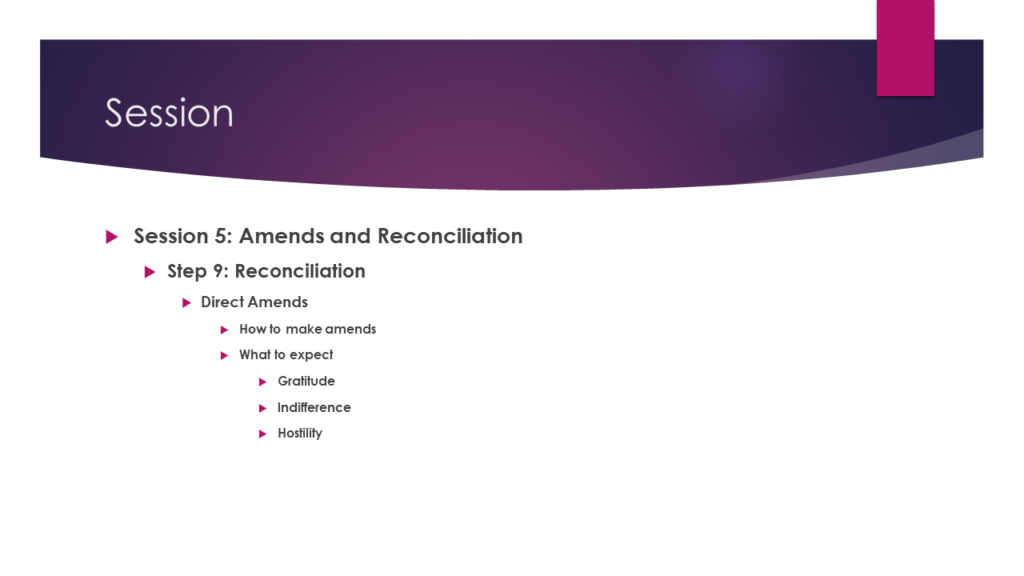
“Hostility.” Indeed, you may meet with the hostility that you fear. Keep in mind that the people to whom you’re making an amends probably have not gone through a program of spiritual growth as you have. They may be smarting from what you’ve said, done, or left undone that badly hurt them. Very likely they’re carrying heavy resentments toward you or even toward other people who have treated them the same way. You may be getting the brunt of years or decades of abuse that this person may have suffered. All the more reason for you not to take their reaction personally. If you anticipate a strong reaction, make sure that you have an exit plan. Even if you don’t succeed in telling them “I was wrong, I apologize, and it won’t happen again,” your good-faith attempt to make the amends is what’s important. Something else you might consider is that strong reactions come from deep hurts. If you hurt the person deeply, it means that they probably once cared deeply about you.
There’s one more possible reaction that you may not be anticipating…
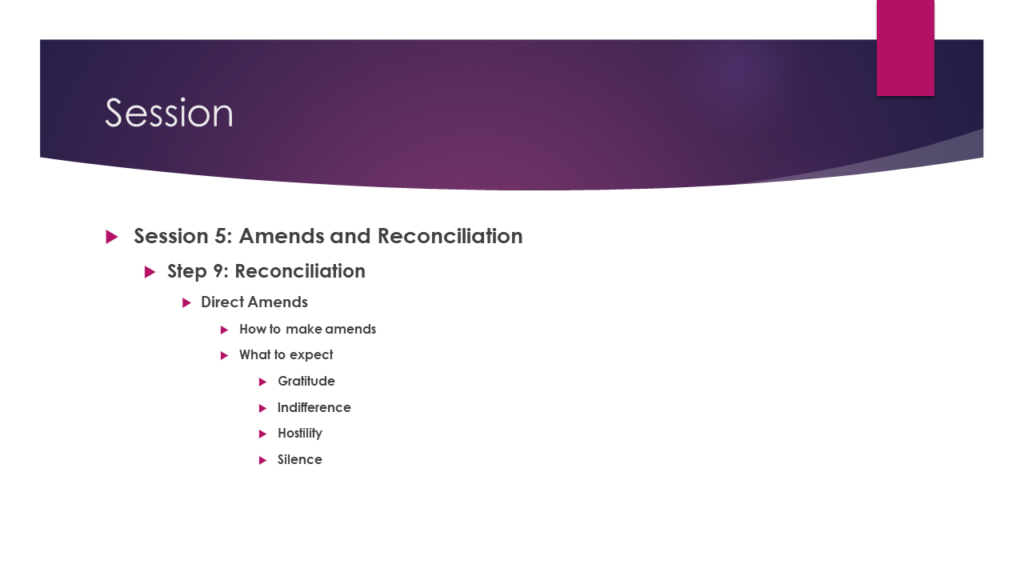
“Silence.” The most unexpected result. Sometimes, your listener just won’t know what to do with your apology, so they react with silence, leaving you to interpret their reaction. Don’t. All you know for sure is that they didn’t react. That’s all. This may happen to you when you’re sharing in person or on the phone. The person may just walk away or hang up. Just remember it’s not about you, it’s about them. You’re most likely to get silence when you write a letter. You may never hear back from them, and that’s okay. You may wonder if they ever got it. There’s no need to pursue any of these any further. You’ve done your part. That’s all that counts for you.
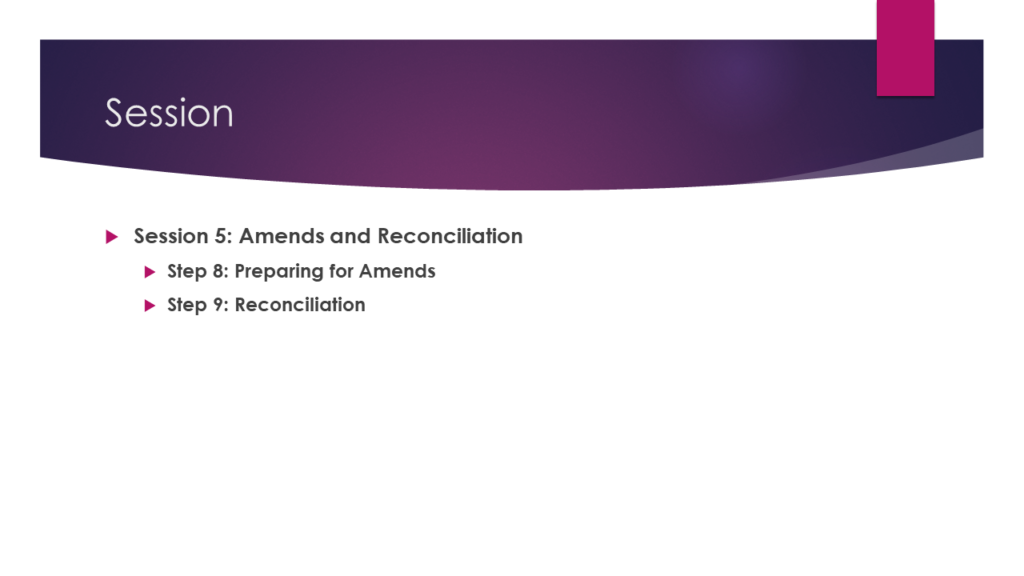
Although we’ve been calling Step 9 “Reconciliation,” we haven’t seen any. Why is that? Think about our interconnections.
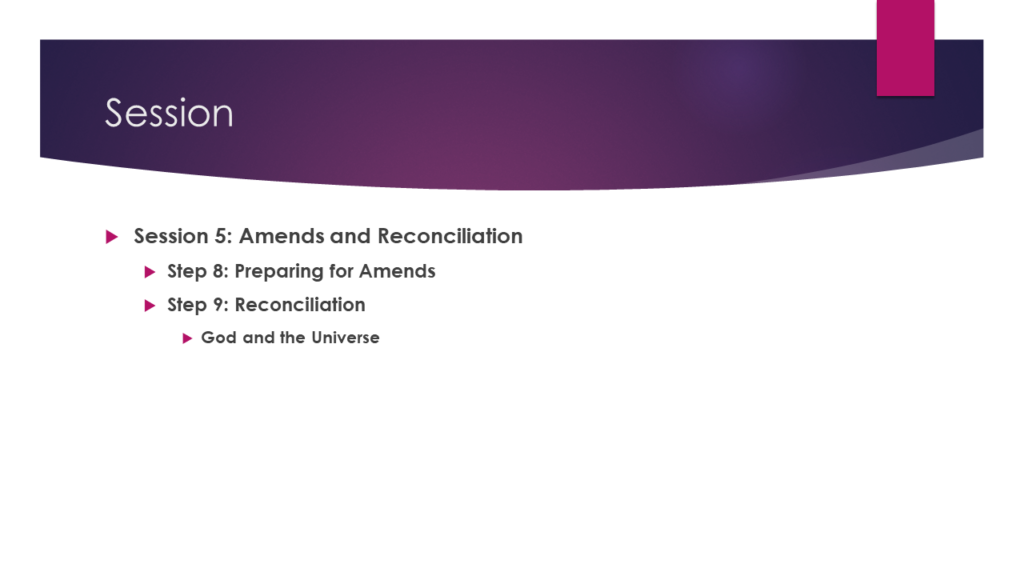
First, there’s our interconnection with God and the Universe. In a sense, being detached from God and the Universe is unnatural. We belong connected. From that perspective, God and the Universe are unceasingly reaching out to us to draw us closer. When we reach back, the interconnection is instantly restored. There’s no further work to be done.
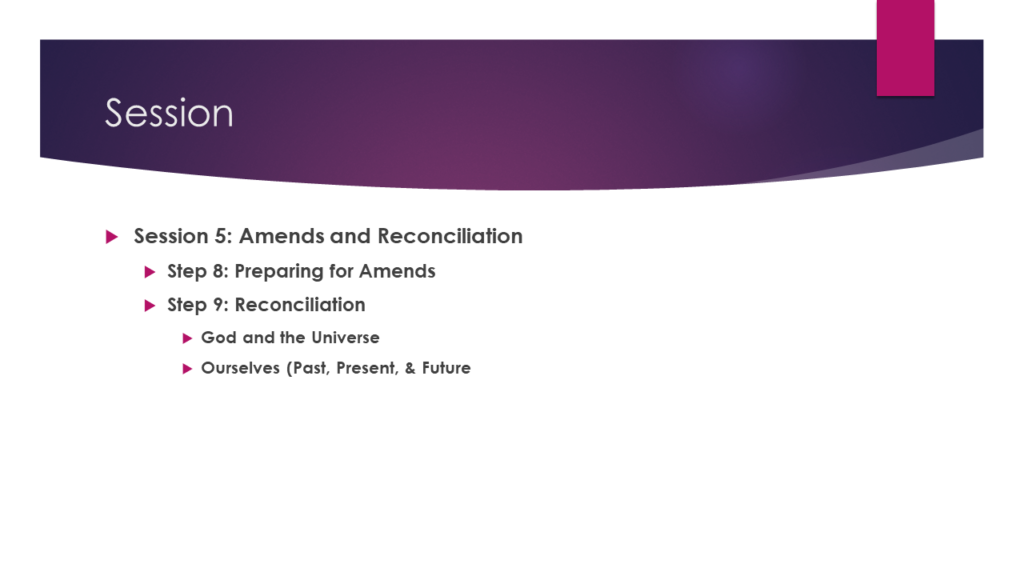
When we’ve been alienated from our better selves—our past selves and our future selves—the alienation is palpable. We’ve been looking in all the wrong places to restore ourselves to sanity, but the insanity remains until we let go absolutely and let God guide. Only then, can we see clearly enough to start cleaning up our messes and allowing the healing Power of our God in to address our brokenness. We long to be whole (again?) and when healing comes, we are at last at home in ourselves. We can look ourselves in the mirror again. It’s a relief.
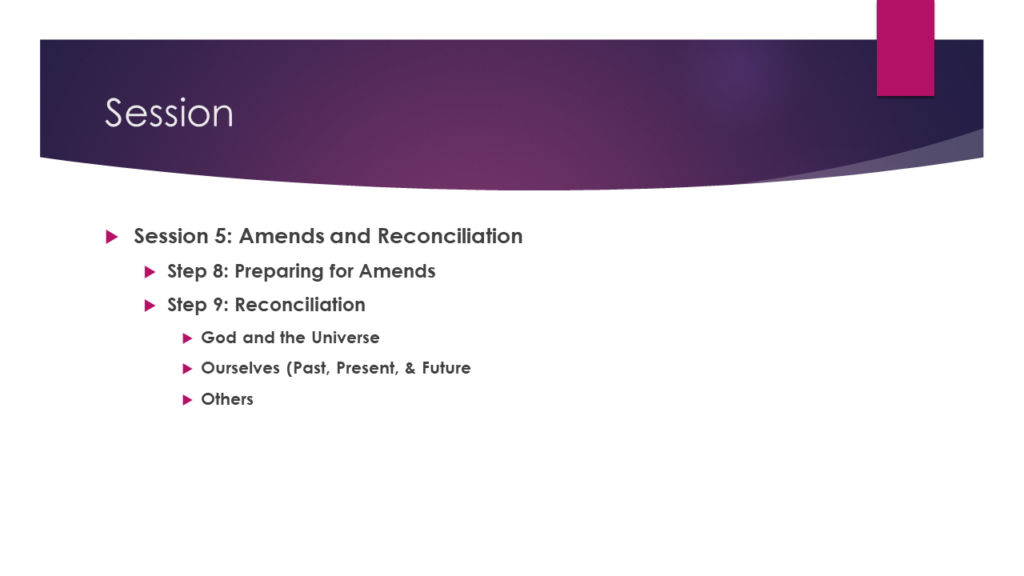
But, what about our relationships with others? Why aren’t we fully reconciled and our interconnections with them restored? The reason is simple: there are two people involved. The will of God and our own wills are anxious to have us reconciled. But with regard to others, we can’t control anyone else’s will. We’re powerless, remember? We’re powerless over other people, places, and things. All we can do with regard to others is to open our hearts and minds and arms to them…and wait. Some will accept our invitation, some won’t. Some relationships will be restored, some won’t. That’s just the way it is. The good news is that, now that our hearts and minds and souls have been reopened, there’s room for new relationships and new interconnections. Sometimes, the old limbs have to fall away to make room for the new ones. That’s how we grow.
So, there you have it. The hard work is done. The fullness of our spiritual lives is deep in the process of being restored. If we’ve been diligent about these nine steps, our spiritual healing is nearly done and we’re well on our way to the spiritual growth that we promised at the outset. Yet, there remain three additional steps. These are the essential steps that keep us from stalling and stagnating or going back to the way we were. The tenth step keeps the progress we’ve made with steps four through seven going forward. The eleventh step keeps the first three steps alive. The twelfth step assures us that steps eight and nine are maintaining their vigor and helping us move our relationships with others forward. We’ll cover all that in our next—our sixth and last—session.
